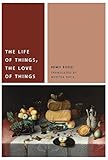The Life of Things, the Love of Things / Remo Bodei.
Material type: TextSeries: CommonalitiesPublisher: New York, NY : Fordham University Press, [2015]Copyright date: ©2015Description: 1 online resource (144 p.)Content type:
TextSeries: CommonalitiesPublisher: New York, NY : Fordham University Press, [2015]Copyright date: ©2015Description: 1 online resource (144 p.)Content type: - 9780823264421
- 9780823264452
- 111.85 23
- BH301.O24 B6313 2015
- online - DeGruyter
- Issued also in print.
| Item type | Current library | Call number | URL | Status | Notes | Barcode | |
|---|---|---|---|---|---|---|---|
 eBook
eBook
|
Biblioteca "Angelicum" Pont. Univ. S.Tommaso d'Aquino Nuvola online | online - DeGruyter (Browse shelf(Opens below)) | Online access | Not for loan (Accesso limitato) | Accesso per gli utenti autorizzati / Access for authorized users | (dgr)9780823264452 |
Browsing Biblioteca "Angelicum" Pont. Univ. S.Tommaso d'Aquino shelves, Shelving location: Nuvola online Close shelf browser (Hides shelf browser)

|

|

|

|

|

|

|
||
| online - DeGruyter In Dante's Wake : Reading from Medieval to Modern in the Augustinian Tradition / | online - DeGruyter Pragmatism with Purpose : Selected Writings / | online - DeGruyter Thresholds of Listening : Sound, Technics, Space / | online - DeGruyter The Life of Things, the Love of Things / | online - DeGruyter So Conceived and So Dedicated : Intellectual Life in the Civil War-Era North / | online - DeGruyter Traditions of Eloquence : The Jesuits and Modern Rhetorical Studies / | online - DeGruyter Ending and Unending Agony : On Maurice Blanchot / |
Frontmatter -- CONTENTS -- 1. Objects and Things -- 2. Opening Up to the World -- 3. Living Nature -- NOTES -- COMMONALITIES
restricted access online access with authorization star
http://purl.org/coar/access_right/c_16ec
From prehistoric stone tools, to machines, to computers, things have traveled a long road along with human beings. Changing with the times, places, and methods of their production, emerging from diverse histories, and enveloped in multiple layers of meaning, things embody ideas, emotions, and symbols of which we are often unaware.The meaning of "thing" is richer than that of "object," which is something that is manipulated with indifference or according to impersonal technical procedures.Things also differ from merchandise, objects that can be sold or exchanged or seen as status symbols. Things, in the philosophical sense, are nodes of relationships with the life of others, chains of continuity among generations, bridges that connect individual and collective histories, junctions between human civilizations and nature.Things incite us to listen to reality, to make them part of ourselves, giving fresh life to an otherwise suffocating interiority. Things also reveal the hidden aspect of a "subject" in its most secret and least explored side. Things are the repositories of ideas, emotions, and symbols whose meaning we often do not understand.In an unexpected but coherent journey that includes the visions of classic philosophers from Aristotle to Husserl and from Hegel to Heidegger, along with the analysis of works of art, Bodei addresses issues such as fetishism, the memory of things, the emergence of department stores, consumerism, nostalgia for the past, the self-portraits of Rembrandt and Dutch still-lifes of the seventeenth century. The more we are able to recover objects in their wealth of meanings and integrate them into our mental and emotional horizons, he argues, the broader and deeper our world becomes.
Issued also in print.
Mode of access: Internet via World Wide Web.
In English.
Description based on online resource; title from PDF title page (publisher's Web site, viewed 02. Mrz 2022)


